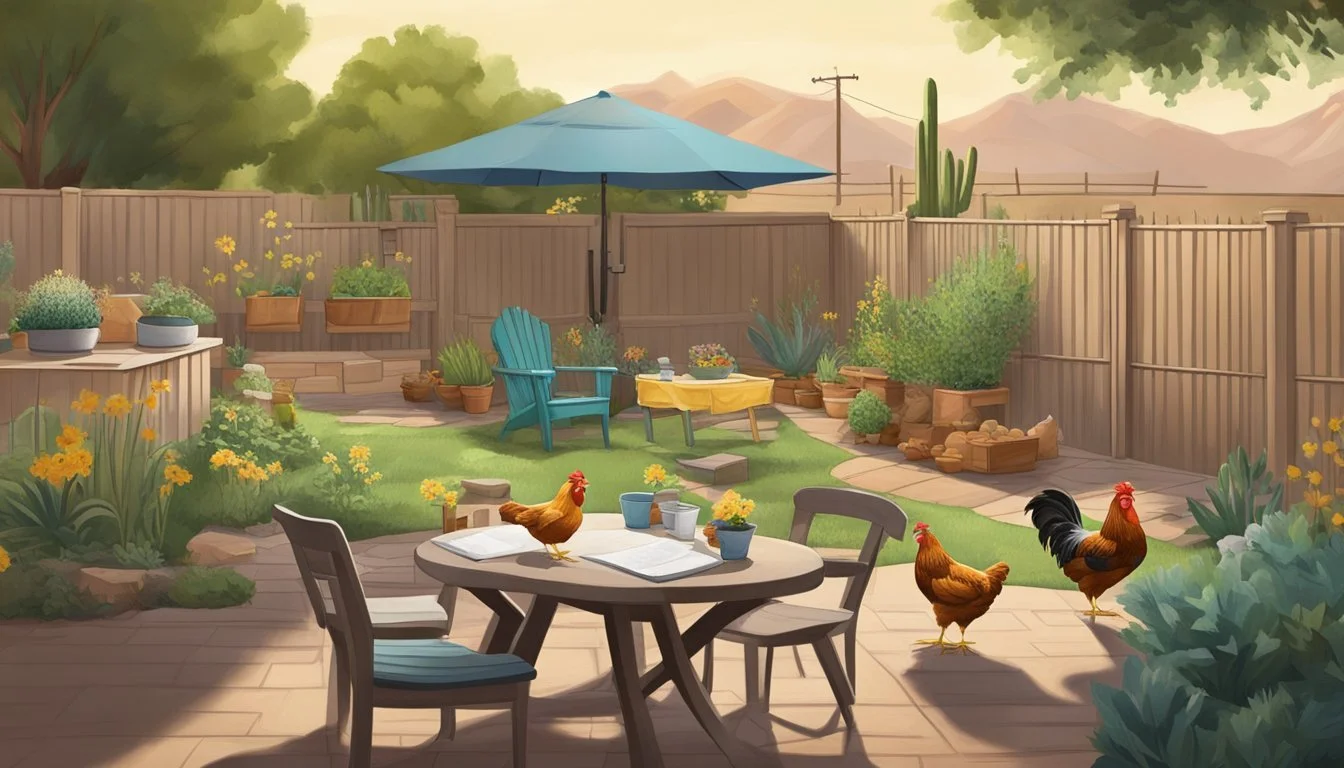Keeping Backyard Chickens in Glendale, AZ
Essential Tips for Urban Poultry Farming
In Glendale, Arizona, the practice of keeping backyard chickens is embraced under specific regulations designed to balance the benefits of urban agriculture with neighborhood harmony. Residents interested in cultivating a small, personal flock will find Glendale's local ordinances supportive of this increasingly popular hobby. The city laws permit residents to keep chickens within residentially zoned areas, acknowledging the joy and practicality that comes from raising these birds.
The city specifies clear guidelines to ensure that chicken coops and runs are maintained responsibly. Coops must be situated at least 20 feet away from property lines and at least 40 feet from neighboring residences, essential stipulations aimed at minimizing potential disturbances such as noise and odor. These rules not only support those interested in raising chickens but also safeguard the rights of other residents to enjoy their own spaces without interference.
As an activity that can yield fresh eggs and provide educational opportunities for families, backyard chicken keeping in Glendale requires diligence in understanding and adhering to local laws. It is crucial for residents to stay informed about the details of these ordinances which can be subjected to changes, guaranteeing their backyard farming aligns with municipal guidelines and contributes positively to the community.
Legality of Backyard Chickens in Glendale
In Glendale, AZ, specific ordinances and zoning requirements are established to govern the keeping of backyard chickens. Homeowners interested in raising chickens must comply with the city's regulations to avoid legal issues.
Understanding Local Ordinances
The City of Glendale permits the keeping of backyard chickens under certain conditions. According to the Glendale City Code, which was updated in 2010, the ordinances have specific requirements that residents must follow. Roosters are generally considered undesirable due to noise issues and are often prohibited in urban and suburban settings. Local ordinance details are critical for residents to ensure they adhere to legal expectations.
Roosters: Prohibited if the lot size is less than half an acre.
Noise: Chickens must be kept in a manner that does not disturb the peace.
HOAs and Local Ordinances: Homeowner associations may have additional restrictions; therefore, it is essential to consult with HOA by-laws in addition to state law and city ordinances.
Zoning and Property Requirements
Under Glendale's zoning laws, the requirements for property and coop setup are clearly defined:
Residential Zoning: Chickens are allowed in residential zones with adherence to space constraints.
Coop Placement: Coops should be situated at least 20 feet from the property line and 40 feet from neighboring residences.
Backyard Size: Recent amendments have reduced the minimum required backyard size from 12,000 to 4,000 square feet.
Enclosures: Chicken pens are not to exceed 200 square feet and should be located at the side or rear of the property, maintaining a 15-foot distance from neighbors.
Property Specifics:
Zoning Designations Livestock Permitting SR-30, SR-17, SR-12 Raising of livestock allowed (excluding swine), one animal per 10,000 square feet of open space.
Residents should consult the League of Arizona Cities and Towns for broader state-level information, but primarily focus on the Glendale City Code for local chicken laws. When considering the implementation of a backyard flock, one must carefully review both zoning problems and potential HOA restrictions.
Setting Up Your Chicken Coop
When preparing to keep a backyard flock in Glendale, AZ, it’s essential to establish a well-designed chicken coop that adheres to local regulations and accommodates your chickens' needs.
Choosing the Right Location
Selecting an appropriate location for a chicken coop requires careful consideration of local ordinances and the birds' well-being. In Glendale, the coop must be positioned at least 20 feet from the property line and least 40 feet away from neighboring homes, ensuring minimal disturbance to neighbors. The chosen spot should provide adequate:
Sunlight: Crucial for the chickens' health.
Shade: To protect from the Arizona heat.
Drainage: To prevent water accumulation and potential health issues.
Coop Design and Space Considerations
The design of the chicken coop should prioritize the safety, comfort, and space needs of the backyard chickens. In Glendale, building codes dictate specific requirements for coops, but here are basic guidelines to follow:
Space: Each chicken requires 2-3 square feet of coop space and 8-10 square feet in the run or pen for movement, ensuring room for activities like scratching and dust bathing.
Roosts: Adequate roosting bars for nighttime perching.
Enclosure: Protection against predators and elements while allowing for ventilation.
Adhering to the guidelines, your coop will serve as a secure and nurturing environment for your backyard flock.
Chicken Care and Management
Responsible chicken care and management are essential for the well-being of backyard chickens in Glendale, AZ. From proper feeding and nutrition to ensuring safety and cleanliness, every aspect contributes to a healthy flock.
Feeding and Nutrition
Chickens require a balanced diet to maintain their health and optimize egg production. A typical diet includes:
Layer pellets: High in calcium, they support eggshell strength.
Grains: A mix of corn, wheat, and oats provides energy.
Vegetables/Greens: To supplement nutrients.
Protein: Occasional mealworms or similar treats can boost protein intake.
It's imperative to provide constant access to clean, fresh water. Water sources should be sanitized regularly to prevent the spread of disease.
Health, Safety, and Sanitation
Chickens must live in a clean, ventilated coop to ensure their health and comfort. Regular cleaning minimizes the risk of diseases and controls the spread of parasites. The coop should be cleaned weekly, and the manure should be removed promptly and can be used as garden compost.
To deter rodents, food should be stored in secure, rodent-proof containers. Proper sanitation practices are necessary to keep the chickens healthy and to maintain a hygienic environment.
Protection from Predators
Chickens are vulnerable to predators such as hawks, dogs, and raccoons. Effective protective measures include:
Sturdy coops and runs: Strong, well-sealed enclosures protect chickens from attacks.
Wire mesh: Hardware cloth is preferable to chicken wire, as it's more durable.
Regularly inspecting the coop for vulnerabilities and promptly repairing any damage ensures continuous protection against predators.
Community Considerations and Neighbor Relations
When keeping backyard chickens in Glendale, Arizona, residents should carefully consider the impacts on their community and maintain good relations with neighbors. Attention to noise, nuisance issues, and adherence to local permitting laws are crucial for harmonious coexistence.
Noise and Nuisance Issues
Backyard chickens in residential neighborhoods can potentially lead to noise complaints, primarily if roosters are part of the flock. The City of Glendale has regulations in place that prohibit roosters in residential areas to mitigate noise concerns. Neighbors may still have concerns about the nuisance caused by chickens. It is advised for chicken owners to place coops at least 20 feet from property lines and 40 feet from neighboring residences to minimize any disruption.
To further minimize nuisance:
Regularly clean the coop to prevent odors.
Limit the number of chickens to a manageable size for your property.
Permitting and Compliance
Residents are required to comply with city ordinances regarding the keeping of backyard chickens. Glendale has made amendments to zoning laws allowing backyard chickens in smaller residential lots, downsizing the requirement from 12,000 square feet to 4,000 square feet. The city council monitors compliance with these zoning laws, and permits may be necessary depending on the number of chickens and the specific local codes.
Below are key compliance points:
Check zoning laws: Ensure your property is zoned for chicken keeping.
Understand permit requirements: Some residential areas may require permits for backyard chickens.
Building requirements: Coops must meet specific building and placement regulations.
Chicken owners should actively engage with their neighbors and the local community to address concerns and maintain positive relationships while observing municipal codes and regulations.
Advantages of Raising Backyard Chickens
Raising backyard chickens in Glendale, AZ, provides a suite of benefits ranging from enhancing food security to offering valuable educational opportunities.
Sustainability and Food Security
One of the leading advantages of keeping backyard chickens is the sustainable production of fresh eggs. Owners can control the diet of their chickens, resulting in a consistent supply of eggs that are free from additives and preservatives. This practice contributes significantly to food security at the household level, ensuring that families have reliable access to a staple source of protein. Additionally, the presence of chickens can reduce food waste, as they can consume various kitchen scraps.
Food Security: Ensures a consistent supply of nutritious eggs.
Environment: By consuming food scraps, chickens reduce household waste.
Educational Benefits
Beyond the tangible food benefits, keeping backyard fowl offers ample educational value. Families and individuals learn about the responsibilies of caring for hens and the lifecycle of these animals. Children, in particular, gain a sense of responsibility and understanding of where their food comes from. Furthermore, engaging with different chicken breeds can enhance knowledge about animal behaviors and their specific care requirements.
Hands-on Learning: Care for chickens teaches responsibility and lifecycle education.
Broadened Knowledge: Exposure to various breeds offers deeper insight into animal husbandry.
Challenges and Common Issues
Backyard chicken keeping in Glendale, AZ, requires preventative measures against wildlife and maintaining cleanliness to prevent odor and pests.
Dealing with Wildlife
Glendale residents must be vigilant as coyotes, bobcats, and raccoons have been known to prey on backyard chickens. These predators are adept at exploiting small gaps in enclosures or taking advantage of inadequate fencing. To safeguard the flock, it's imperative to fortify chicken coops with sturdy materials and secure locking mechanisms.
Coyotes: They can easily scale low fences. A tall fence, at least 6 feet high with a roll bar, can deter them.
Bobcats: These climbers require a covered enclosure to prevent them from getting to the chickens.
Raccoons: Known for their dexterity, raccoons can open latches, so raccoon-proof locks are necessary.
Managing Waste and Odors
Maintaining a sanitary environment is crucial to prevent odors and insect infestations, such as flies. Regular cleaning of the coop and proper waste management are critical.
Sanitation: Daily removal of feces and soiled bedding will minimize odors.
Ventilation: Adequate airflow is important to keep the ammonia fumes from building up.
Insects: Keeping the coop dry and cleaning food spills promptly will help deter insect infestations.
Additional Resources and Legal Changes
In the evolving landscape of urban agriculture, staying apprised of the latest legal changes and engaging with local resources is crucial for Glendale residents interested in keeping backyard chickens.
Staying Informed on Updates
Glendale City Code Updates: The city updates its code periodically, impacting residents who keep or plan to keep backyard chickens. For example, a significant update happened in 2010 concerning accessory uses for fowl in residential zones. Residents can find the most current regulations and guidelines on the official Glendale city website at www.glendaleaz.com.
Legislative Changes: It's important to monitor any state-wide changes proposed by various state lawmakers. For instance, Rep. Kevin Payne has previously been involved in passing related legislation. Monitoring the House Committee on Land, Agriculture and Rural Affairs can offer insights into statewide trends affecting local rules.
Local Workshops and Community Groups
Workshops and Guides: Local workshops can provide critical, hands-on knowledge about chicken care and are sometimes offered in nearby cities such as Phoenix, Tucson, and Tempe. Feed stores in the area may also offer guides and expert advice.
Connecting with Neighboring Cities: Regulations and practices in nearby Peoria, Scottsdale, and other Arizona cities can influence Glendale's backyard chicken scene. Engaging with community groups from these cities can offer a broader understanding of urban farming in the region.
Research and Networking: Howard Fischer's coverage and discussion by local media can be a relevant source of information. Networking with other backyard chicken enthusiasts through local online forums or community groups ensures that Glendale residents are aware of the most recent legal changes and available resources.







